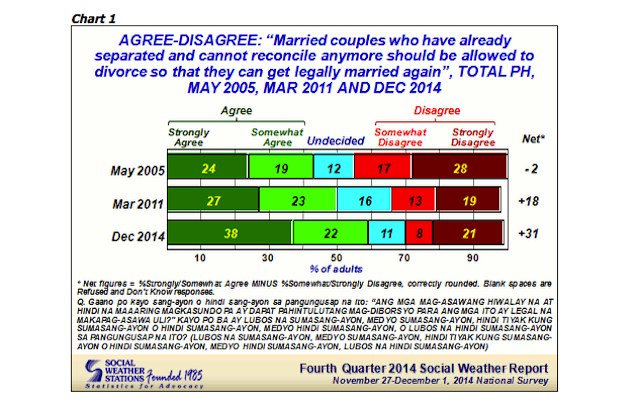SUMMARY
This is AI generated summarization, which may have errors. For context, always refer to the full article.


MANILA, Philippines – More and more Filipinos are becoming in favor of legalizing divorce in the Philippines.
A Social Weather Stations survey released on Monday, March 23, found that 60% of adult Filipinos support divorce for “married couples who have already separated and cannot reconcile anymore, so that they can get legally married again.”
It was the first time that “public support for legalization of divorce for irreconcilably separated couples grew to a clear majority of 60% in December 2014, from a plurality of 50% in March 2011 and a split opinion of 43-44% in May 2005,” the SWS said.
The survey was conducted using face-to-face interviews of 1,800 adults nationwide from November 27 to December 1, 2014. It had sampling error margins of ±2% for national percentages, ±6% for Metro Manila, Balance Luzon, and Mindanao areas percentages, and ±3% for Visayas area percentages.
Among the 60% who expressed support for divorce, 38% “strongly” agreed with its legalization, while 22% “somewhat agreed.” In contrast, 21% strongly disagreed with the proposal while 8% somewhat disagreed. About 11% were undecided.
Support for the legalization of divorce has been on an upward trend since 2005, survey results showed.
In 2011, 50% of those survey said they agreed with the proposal, compared to 33% who did not. In 2005, opinion was split: 43% agreed while 44% disagreed.
SWS said the +31 net agreement in December 2014 was considered “strong,” compared to the “moderate” +18 agreement in March 2011 and “the neutral” -2 net agreement in May 2005.
Aside from Vatican City, the Philippines – where Roman Catholicism is the predominant religion – is the only state in the world where divorce remains illegal.

Rise in support
Support for divorce increased across Luzon, the Visayas, and Mindanao regardless of sex and marital status.
From 2011 to 2014, support for divorce rose from:
- 52% to 67% in Metro Manila
- 54% to 62% in Balance Luzon
- 50% to 55% in the Visayas
- 44% to 55% in Mindanao
The survey also found that majority of male and female Filipinos favor the legalization of divorce, regardless of whether they are single, married, or with live-in partners.
The survey meanwhile noted that support for divorce has always been strong among those with live-in partners since the 2005 survey.
About 16% of Filipinos have live-in partners as of December 2014, up from 8% in March 2011, according to survey results.
Among those with live-in partners, 66% agreed with legalizing divorce in December 2014, up from 62% in March 2011 and 63% in May 2005.
Among social classes, the biggest increase in support was found in classes D and E.
“Since 2005, net agreement with legalizing divorce for separated couples has always been moderate in class ABC, while it switched from neutral to strong in class D, and from poor to moderate in class E,” SWS said.
Cabinet has not discussed divorce
Palace Communications Secretary Herminio Coloma Jr said the issue has not been discussed as far as the executive branch is concerned.
“Ang mga mamamayan ay may kapangyarihang ipaabot sa kanilang mga kinatawan sa Kongreso ang kanilang mga saloobin hinggil sa usapin ng divorce. Hindi pa tinatalakay sa Gabinete ang isyung ito,” Coloma said.
(Citizens have the power to take their opinions regarding divorce to their representatives in Congress. The Cabinet has not discussed this issue.)
In a November 2014 forum, Filipino journalist Ana Santos said pro-divorce advocates can manage to secure support for the measure if it gains the same traction as the passage of the landmark reproductive health (RH) law.
The RH law managed to hurdle Congress despite strong opposition from the Catholic Church, due in part to the support of President Benigno Aquino III for the measure.
During the 2013 elections, more senatorial candidates voiced opposition to the passage of the divorce law than those who favored it. (READ: Most Senate bets vs divorce)
It remains to be seen whether growing public sentiment in favor of legalizing divorce would have an effect on lawmakers’ respective stands, with the 2016 elections fast approaching.
– Rappler.com
Add a comment
How does this make you feel?
There are no comments yet. Add your comment to start the conversation.